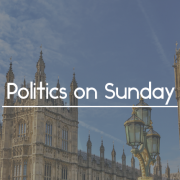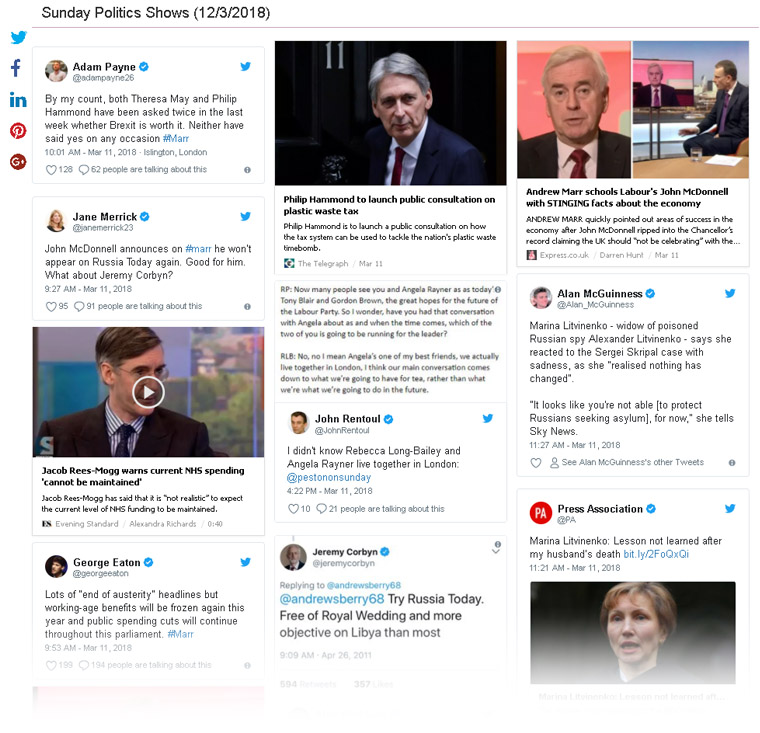Today’s Political Headlines – 16 March 2018
Today’s Political Headlines include Corbyn defending his position over the Salisbury poisoning, Google funding supportive think thanks, business leaders demanding a Brexit transition agreement and stay at home mums denied the right to a full state pension.
Corbyn defends response to Salisbury poisoning
Jeremy Corbyn has written in The Guardian, defending his response to the Salisbury poisoning, warning Theresa May against ‘rushing way ahead of the evidence’. The paper says that there appear to be divisions on the issue in the shadow cabinet, with Emily Thornberry and Nia Griffith taking tougher stances. Yesterday, as the BBC reports, Defence Secretary Gavin Williamson said that Russia should ‘go away and ‘shut up’. The Times reports on the ‘unusual joint statement’ made by the French, German, American and British leaders, condemning Russian for ‘an assault on UK sovereignty’.
Google spends tens of millions of pounds funding think tanks
A report seen by The Times, shows that Google has spent tens of millions of pounds funding think tanks that published papers supporting its policy interests. The US Campaign for Accountability report examined five institutions in the UK and Europe, including Nesta’s Research Alliance for a Digital Economy (Readie).
Business leaders stress urgent need for Brexit transition agreement
The Financial Times reports that business leaders highlighted the urgent need for a finalised Brexit transition deal when they met the Prime Minister yesterday, adding that the Irish border remains the biggest remaining obstacle to reaching a transition deal next week. The Guardian claims that the Government has been asking businesses to sign secrecy agreements when they discuss border issues with it, including no-deal Brexit scenarios.
50,000 stay at home mothers denied right to full state pension
Nicky Morgan, chair of the Commons Treasury Committee, has written to officials, raising concerns that 50,000 stay at home mothers may miss out on a full state pension as a result of changes to the state benefit system, owing to what The Daily Telegraph calls a ‘Government blunder’.
Grenfell Tower doors could only hold fire back for half the intended time
Investigators have found that doors in Grenfell Tower were only capable of holding back flames for half of their intended time, as an article in The Sun says. Sajid Javid told the House of Commons that there was ‘no evidence’ that this was a ‘systematic issue’ and that further updates would be provided by the end of April.
Cambridge Analytica pitched illegal offer targeting foreign donors to Leave.EU
The Guardian reports that documents released by the Commons Digital, Culture, Media & Sport Committee show that Cambridge Analytica proposed raising money form foreign supporters on behalf of Leave.EU, in breach of UK election law. However, Leave.EU did not take up the offer. The documents were supplied to the committee by Arron Banks, the campaign’s backer, to rebut claims made by Cambridge Analytica’s chief executive.
Javid becomes fifth MP to receive ‘Punish a Muslim’ package
The Times reports that Sajid Javid has become the fifth MP to receive a suspicious package and a letter calling for a ‘Punish a Muslim’ day. The letters are currently being investigated by counterterrorism police. The other recipients have been Rupa Huq, Rushanara Ali, Mohammad Yasin and Afzal Khan.
GMB criticises reliability of green power sources
The Sun carries details of a report by the GMB, which claims that on 65 days last year, turbines supplied less than 10% of their potential for at least half a day, leaving the UK reliant on gas, nuclear and coal. The union’s national secretary, Justin Bowden, said, ‘It is the facts, not the hype, which should determine the UK’s energy policy decisions.’
Find out more about Vuelio Political services?




















 Jenifer Stirton is the Director of Stockbridge PR
Jenifer Stirton is the Director of Stockbridge PR Sarah Stimson is the chief executive of the Taylor Bennett Foundation
Sarah Stimson is the chief executive of the Taylor Bennett Foundation Jennifer Thomas is the Head of Internal Communications, Experience & Sustainability at Direct Line Group
Jennifer Thomas is the Head of Internal Communications, Experience & Sustainability at Direct Line Group
 Ronke Lawal is the founder of Ariatu PR and sits on the board of the CIPR
Ronke Lawal is the founder of Ariatu PR and sits on the board of the CIPR Sarah Pinch is the managing director of Pinch Point Communications and chair of the Taylor Bennett Foundation
Sarah Pinch is the managing director of Pinch Point Communications and chair of the Taylor Bennett Foundation Jo-ann Robertson is CEO of Ketchum London
Jo-ann Robertson is CEO of Ketchum London
 Shamima Begum is an executive director at Golin
Shamima Begum is an executive director at Golin Sarah Hall is a PR and marketing agency owner, founder of #FuturePRoof and President of the Chartered Institute of Public Relations (CIPR) for 2018
Sarah Hall is a PR and marketing agency owner, founder of #FuturePRoof and President of the Chartered Institute of Public Relations (CIPR) for 2018 Bibi Hilton is the president of Women in PR and MD of Golin London
Bibi Hilton is the president of Women in PR and MD of Golin London